|
|
|
Sort Order |
|
|
|
Items / Page
|
|
|
|
|
|
|
| Srl | Item |
| 1 |
ID:
121818
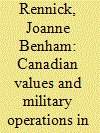

|
|
|
|
|
| Publication |
2013.
|
| Summary/Abstract |
Whereas traditionally religion has played a central role in shaping the shared values in a society, secularization, privatization of religion, and pluralism are changing the values that personnel bring to the Canadian Forces. This late modern reality means that many people who have rejected traditional forms of religion in order to interpret their personal spiritual beliefs for themselves are uncertain about their core values. Differences in values among military personnel are further complicated by the realities of modern military engagements that require a greater need for ethical thinking and moral decision making. This article examines the nature of religion and values in late modern Canadian society and identifies religious leadership as a source of moral and ethical direction as well as consolation in the face of moral anomie. Finally, it highlights the need for greater education about the role of religion and values for military personnel.
|
|
|
|
|
|
|
|
|
|
|
|
|
|
|
|
| 2 |
ID:
121814
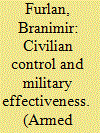

|
|
|
|
|
| Publication |
2013.
|
| Summary/Abstract |
This article gives an overview of how civilian control of the military in Slovenia is implemented in practice. It utilizes the perspective of the controlled entity itself, that is, the Slovenian Armed Forces. The findings show the type and characteristics of civilian control in Slovenia and how they hinder military effectiveness. As one of the European transition countries to have concluded the democratization of its civil-military relations, civilian control over Slovenia's Armed Forces is now in place; however, the control mechanisms have had several debilitating effects on the country's armed forces-the democratization of civil-military relations has been achieved at the partial expense of military effectiveness. Because of this experience, the Slovenian case could serve as an example of how successful democratization of civil-military relations can sometimes produce negative outcomes, or collateral damage, for the military, especially when the employers of the control mechanisms are not aware of the effects that the exercise of their control might have on the military's ability to execute core missions. Methodologically, this article brings an approach for analyzing interrelations between civilian control and military effectiveness.
|
|
|
|
|
|
|
|
|
|
|
|
|
|
|
|
| 3 |
ID:
121816
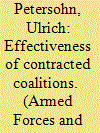

|
|
|
|
|
| Publication |
2013.
|
| Summary/Abstract |
The debate on the effectiveness of Private Security Contractors (PSCs) in Iraq has been waged ever since their first appearance. Statists have argued that they are much less effective than regular troops, while neoliberals consider them an effective supplement to regular troops. However, so far, both schools alike have drawn on anecdotal evidence only; yet, such evidence is prone to a high margin of error and does not allow a comparison of different actors. This article addresses these shortfalls by providing hard data, drawn from the Wikileaks "Iraq War logs" data set, on the conduct of PSCs in Iraq and comparing their performance to that of regular troops, that is, the US and Iraqi armed forces. In general, if PSCs are co-deployed alongside regular troops and oversight is institutionalized, their performance supersedes that of poorly trained military personnel, such as the Iraqi military, and in many cases even that of the highly capable US military.
|
|
|
|
|
|
|
|
|
|
|
|
|
|
|
|
| 4 |
ID:
121815
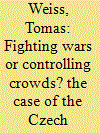

|
|
|
|
|
| Publication |
2013.
|
| Summary/Abstract |
The article explores the reform of the Czech military from the perspective of the possible blurring of police and military functions. The understanding of security has changed in recent years and the European militaries have taken up nontraditional tasks both within and outside Europe. Moreover, the fiscal conditions have provoked further reconsideration of the role of military. The Czech Republic's armed forces have undergone a number of reforms since 1989. The article focuses on three factors distinguishing the military from the police: territorial scope, use of force, and responsibility before the law. It concludes that although the Czech military has become more flexible, it does not use all its potential in practice, especially domestically. The article suggests that despite the adaptation to the new security environment, the military continues to be distinct from police.
|
|
|
|
|
|
|
|
|
|
|
|
|
|
|
|
| 5 |
ID:
121812


|
|
|
|
|
| Publication |
2013.
|
| Summary/Abstract |
War causes trauma that can undo a warrior's character. Sophocles' Ajax is a good example of a traumatized warrior and some Afghanistan and Iraq veterans see striking parallels between contemporary conflicts and the Trojan War. With the United States increasingly facing asymmetrical enemies, there are now many traumatized soldiers and vets, not only suffering from posttraumatic stress disorder (PTSD) but also committing suicide. Combat stress, being central to warfare, has until now been incurable. Today, advanced military R&D projects aim to find a "magic pill" to forestall PTSD. Propranolol may be such a drug, as it could be used to prevent PTSD by "erasing" emotional memories. However, this attempt at pharmacoprevention raises many ethical questions. Most importantly, it threatens to instrumentalize away the existential element of war and to push warfare into a posthuman age. To better understand the challenges we are facing today, it is important not only to read Aldous Huxley's Brave New World but also to go back to the Greeks.
|
|
|
|
|
|
|
|
|
|
|
|
|
|
|
|
| 6 |
ID:
121813


|
|
|
|
|
| Publication |
2013.
|
| Summary/Abstract |
An enduring assumption exists in the United States that past military service casts electoral candidates in a positive light. To demonstrate how voters understand candidates' military experiences, it is necessary to understand how their attitudes about a candidate change when exposed to biographic information. This study uses an experimental design to evaluate whether voters see candidates with a military background as better able to handle defense and security issues, are more capable leaders, and whether voters express higher affect toward veteran candidates. Using manipulated television advertising and handbills from an actual election, along with variation of the party information about the candidate, this study finds that voters are unmoved in their impressions of leadership and their affect toward a candidate with military experience. However, potential voters report markedly higher evaluations of candidates' ability to handle defense and security issues when exposed to the military cue, irrespective of party affiliation.
|
|
|
|
|
|
|
|
|
|
|
|
|
|
|
|
| 7 |
ID:
121817
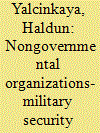

|
|
|
|
|
| Publication |
2013.
|
| Summary/Abstract |
The question this article addresses is how and to what extent international military forces can support nongovernmental organizations (NGOs) in armed conflicts and postconflict arenas. As non-state actors, NGOs have serious security problems and their current protection is not sufficient to secure humanitarian operations. The Afghanistan NGO Safety Office (ANSO) was established in 2002 to solve this problem. The ANSO innovation resulted in a new NGO-military security collaboration mechanism. In particular, the article examines whether the NGO-military security collaboration mechanism established between NATO International Security Assistance Force, the United Nations Assistance Mission in Afghanistan, and the ANSO could be a fourth way in narrowing NGOs' security gap in addition to the existing three ways (judicial, theoretical, and practical). I would argue international military forces need to take into account ANSO model organizations for fulfilling their responsibility to secure NGOs in armed conflicts and postconflict arenas.
|
|
|
|
|
|
|
|
|
|
|
|
|
|
|
|
| 8 |
ID:
121820
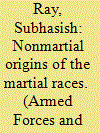

|
|
|
|
|
| Publication |
2013.
|
| Summary/Abstract |
Did colonial rule "construct" the "martial races" or do these groups have an innate cultural disposition toward military service? Despite the centrality of this question for evaluating different military manpower recruitment strategies in postcolonial settings, no study has subjected these hypotheses to systematic empirical testing. This article fills this gap using an original data set on the colonial status of 181 ethnic groups across twenty-nine ex-British colonies to examine the origins of colonial "martialness." The empirical analysis provides robust evidence in support of the constructivist argument.
|
|
|
|
|
|
|
|
|
|
|
|
|
|
|
|
| 9 |
ID:
121819


|
|
|
|
|
| Publication |
2013.
|
| Summary/Abstract |
Uganda suffered coups between 1966 and 1985, but has remained stable since 1986 despite predisposition to previous coups. Ethnic antagonism, weak state institutionalization, and past coups, had made Uganda coup-prone. Compared to previous governments, the post-1986 leadership effectively applied and undertook coup-prevention strategies consistent with James Quinlivan's coup-proofing theory. These include establishing a parallel military structure to the mainstream military; formation of security services with parallel reporting channels, monitoring over society, and other security agencies; and co-optation of the military in politics through parliamentary representation. These measures have helped the regime to watch over security agencies and prevent possible military intervention. Uganda's post-1986 regime stability is interesting in its own right. But it provides evidence consistent with, and useful for testing the efficacy of, Quinlivan's coup-proofing theory: with relevant application and domestication the theory applies to Uganda.
|
|
|
|
|
|
|
|
|
|
|
|
|
|
|
|
|
|
|
|
|